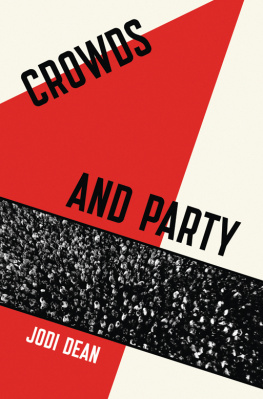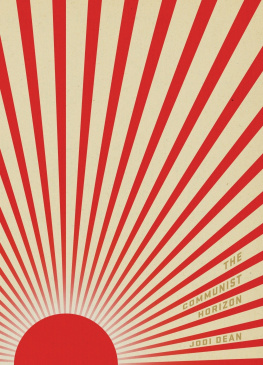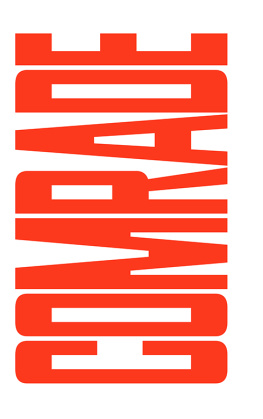Jodi Dean - Crowds and Party
Here you can read online Jodi Dean - Crowds and Party full text of the book (entire story) in english for free. Download pdf and epub, get meaning, cover and reviews about this ebook. year: 2016, publisher: Verso, genre: Politics. Description of the work, (preface) as well as reviews are available. Best literature library LitArk.com created for fans of good reading and offers a wide selection of genres:
Romance novel
Science fiction
Adventure
Detective
Science
History
Home and family
Prose
Art
Politics
Computer
Non-fiction
Religion
Business
Children
Humor
Choose a favorite category and find really read worthwhile books. Enjoy immersion in the world of imagination, feel the emotions of the characters or learn something new for yourself, make an fascinating discovery.
Crowds and Party: summary, description and annotation
We offer to read an annotation, description, summary or preface (depends on what the author of the book "Crowds and Party" wrote himself). If you haven't found the necessary information about the book — write in the comments, we will try to find it.
Crowds and Party — read online for free the complete book (whole text) full work
Below is the text of the book, divided by pages. System saving the place of the last page read, allows you to conveniently read the book "Crowds and Party" online for free, without having to search again every time where you left off. Put a bookmark, and you can go to the page where you finished reading at any time.
Font size:
Interval:
Bookmark:

AND
PARTY
First published by Verso 2016
Jodi Dean 2016
All rights reserved
The moral rights of the author have been asserted
1 3 5 7 9 10 8 6 4 2
Verso
UK: 6 Meard Street, London W1F 0EG
US: 20 Jay Street, Suite 1010, Brooklyn, NY 11201
versobooks.com
Verso is the imprint of New Left Books
ISBN-13: 978-1-78168-694-2
eISBN-13: 978-1-78168-672-0 (US)
eISBN-13: 978-1-78168-766-6 (UK)
British Library Cataloguing in Publication Data
A catalogue record for this book is available from the British Library
Library of Congress Cataloging-in-Publication Data
A catalog record for this book is available from the Library of Congress
Typeset in Fournier by MJ & N Gavan, Truro, Cornwall
Printed in the US by Maple Press
For Paul, with love
Writing is solitary. Thinking is collective. I am grateful to the many who extended the time, support, and critical energy that went into this book. Numerous comrades demonstrated solidarity with my project in multiple waysalerting me to relevant texts, engaging my arguments in various media, providing new opportunities, pushing me to be clearer, bolder, disagreeing. These include but are not limited to Maria Aristodemou, Darin Barney, Tamara dAuvergne, Donatella Della Ratta, Liza Featherstone, Jon Flanders, Doug Henwood, Bonnie Honig, Penelope Ironstone, Jason Jones, Andreas Kalyvas, Anna Kornbluh, Regina Kreide, Elena Loizidou, Davide Panagia, Korinna Patelis, Alexei Penzin, Artemy Magun, Joe Mink, Joe Ramsey, Kirsty M. Robertson, Corey Robin, John Seery, Joshua Sperber, Mina Suk, and Phillip Wegner.
I want to thank the Society for the Humanities at Cornell University for the Fellowship that enabled me to draft the books early chapters. I appreciate the critical responses from the Societys 20132014 Fellows as well as the feedback from the Government Departments Political Theory Workshop. I am particularly indebted to Jason Frank, Anna-Marie Smith, Jason E. Smith, Becquer Seguin, and Avery Slater for their close readings of these chapters. The Society for the Humanities also provided generous support for the Fall 2013 conference, Communist Currents, that I co-organized with Jason Smith and Bruno Bosteels. The conversations in and around this conference, as well as the resulting symposium published in South Atlantic Quarterly, were invaluable critical stimuli for Crowds and Party. Thanks go to Banu Bargu, Aaron Benanav, Bruno Bosteels, George Ciccariello-Maher, Joshua Clover, Susana Draper, James Martel, Sandro Mezzadra, Brett Neilson, Jordana Rosenberg, Alessandro Russo, Anna-Marie Smith, Jason Smith, Alberto Toscano, and Gavin Walker. Thanks as well to Michael Hardt for encouraging and publishing the symposium.
Additional opportunities to present chapter drafts helped me clarify my arguments. Thank you to the organizers, participants, and respondents at Johns Hopkins, Columbia, the University of Chicago, the Marxist Literary Group, the New School, and the CUNY Graduate Center and to fellow panelists and interlocutors at the 2015 Western Political Science Association Annual Meeting and American Political Science Annual Meeting. Thanks as well to comrades with Philly Socialists.
Special thanks go to Hannah Dickinson and Rob Maclean for their thoughtful commentaries and suggestions. I am also deeply indebted to James Martel, not just for his close reading of the entire manuscript but also for his ongoing enthusiasticand criticalengagement with my project. Kian Kenyon-Dean and Sadie Kenyon-Dean continue to inspire and provoke. Finally, I am grateful to Paul A. Passavant for his careful readings, our ongoing discussions, and the form of life we make together.
On October 15, 2011, a massive crowd filled New Yorks Times Square. Most were Occupiers, demonstrating in concert with anti-capitalist protests in nine hundred cities around the world. October 15 was also the five-month anniversary of Spains movement to occupy the squares. Half a million people came out in Madrid. Riots broke out in Rome. In Times Square, nearly thirty thousand people blocked traffic as mounted police pushed them up against quickly set-up barricades. Tourists caught in the crush joined the Occupiers in chanting We are the 99 percent.
I had been separated from my group at Sixth Avenue when police started blocking streets to prevent more people from joining up with the protest. I made my way through to a small traffic island at Broadway and Forty-Third. A couple of shoppers, crammed up against those of us with signs, excitedly asked whether we were going to occupy Times Square. They added that they supported Occupy Wall Street and were glad that someone was finally doing something. Together we booed the police when they dragged off protesters who ventured beyond the barricades.
That fall Occupy Wall Street was the most important thing in On the New York City subways, passengers read the Occupy Gazette and the Occupied Wall Street Journal. People praised the Occupiers and condemned the police. We all wondered how far we could go. Would it be, as Adbusters had urged in an initial call for the occupation of Wall Street, our Tahrir moment?
After the Times Square demonstration, many of us proceeded down to Washington Square Park for a general assembly (GA). The general assembly was a primary organizational form during the Occupy movement. Prominent in the Spanish demonstrations and indebted to the horizontalism and autonomy of movement practices in Argentina and Mexico, the GA structures discussion according to democratic egalitarian principles aiming toward consensus. By the time I arrived in Washington Square Park, what looked like a thousand people were sitting in a circle near the parks center. Multiple police vans lined the curb just outside the parks fence on lower Fifth Avenue. A few barricades were scattered near the Washington Square Arch. Twenty or thirty police stood around faux-casually. Over the next few hours, they would close in to form a line.
At the GA, people were debating whether we would take the park. Some had brought tents and sleeping bags with an eye to spreading the occupation from Zuccotti to Washington Square. Zuccotti Park, renamed Liberty Square during the occupation, had rapidly become overcrowded. Although its proximity to Wall Street gave it enormous symbolic value, its location on the edge of New Yorks financial district was inconvenient. The local fast food restaurants had been accommodating, even welcoming, but the paucity of nearby toilet and shower facilities was taking its toll on the hundreds of Occupiers sleeping in the park. In contrast, Washington Square Park is next to New York University, close to the New School and Cooper Union, easily reachable by subway, and, all in all, in a popular, visible, heavily trafficked part of the city.
We knew that Washington Square Park was closing at midnight. We felt the police tightening their line, starting to deny newcomers entry to the park. After the fifteen-minute or so breakout session where we talked with those around us about taking the park, we pulled back together as one assembly. Speaker after speaker, amplified by the Peoples Mic (where the crowd repeats the words of a speaker so that those who are farther away know what is being said), urged us to take the park. We are many. We outnumber them. We can do it. We must do it. Upraised hands twinkled approval in waves of support round and round the circle. Then, a tall, thin, young man with curly dark hair and a revolutionary look began to speak.
Font size:
Interval:
Bookmark:
Similar books «Crowds and Party»
Look at similar books to Crowds and Party. We have selected literature similar in name and meaning in the hope of providing readers with more options to find new, interesting, not yet read works.
Discussion, reviews of the book Crowds and Party and just readers' own opinions. Leave your comments, write what you think about the work, its meaning or the main characters. Specify what exactly you liked and what you didn't like, and why you think so.













